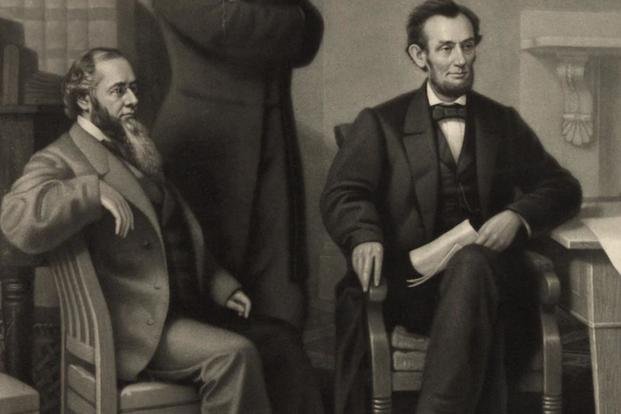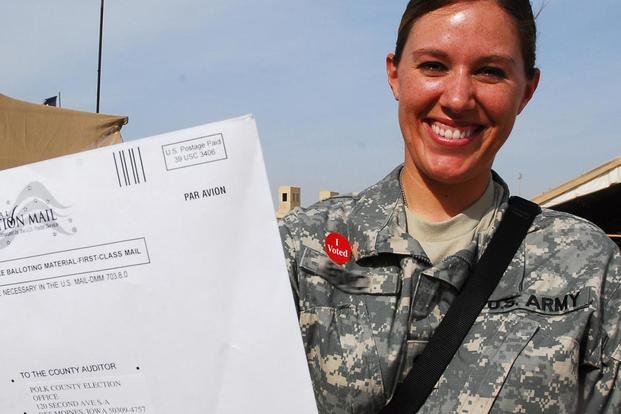Few U.S. elections were more contentious and controversial than the one in 1864. Looking back at more than 100 years of history since, it might be difficult to imagine any outcome other than Abraham Lincoln winning in a landslide election.
But it was the votes of U.S. troops that put Lincoln over the top and forever changed the way Americans at war vote in elections.
In 1864, the future of the presidency wasn't certain. Lincoln was facing a re-election battle that seemed as brutal as the Union victory at Antietam just two years earlier -- and he was facing the architect of that victory, Gen. George B. McClellan.
Meanwhile, many of Lincoln's policies were unpopular in the United States. Some Americans believed a negotiated peace was the best way to end the Civil War. Others scoffed at the Enrollment Act, the Civil War-era draft that not only conscripted American men but allowed rich men to pay someone to take their place in the service. Some were even outraged by Lincoln's Emancipation Proclamation of 1863, fearing that freeing slaves in rebel states would lead to universal emancipation.
While Lincoln exercised his power to prosecute the war, he also fought battles in the Republican Party to remove him as its chosen candidate. Those attempts, of course, failed, but it made the prospect of a general election defeat more real for the wartime president.
McClellan, who commanded the Union Army at the outset of the Civil War, declared his candidacy for president in 1864, running as a Democrat while on active duty. He was unhappy with how Lincoln and his Secretary of War Edwin Stanton were managing the fight. He had thoughts of his own about how to run the Army and the war it was fighting.

Democrats, however, were willing to negotiate a peace with the Confederacy. The Republicans were ready to see the war through to the end. Meanwhile, many questioned why the U.S. would have an election at all. Lincoln made sure that a democratic election happened, even during wartime, whatever the cost -- even though he was sure he would lose.
McClellan was the front-runner from the moment he was nominated. Democrats labeled Lincoln a "widow-maker," and spread false information declaring the president was in favor of mixed-race marriages, among other political tricks. He and Stanton did what they could to keep Lincoln in the race.
From the start of Lincoln's administration, Stanton had not been a big fan of the president. He thought of Honest Abe as less of a statesman and more of a country bumpkin. But Lincoln admired Stanton and made him his war secretary. As the war dragged on, the two men began to work closely with one another, even if they didn't always see eye to eye.
One thing they did agree on was their mutual disdain for McClellan and the general's inactivity at the front. Stanton and Lincoln both believed he should be replaced, and he soon was.
It was Stanton's idea to create an absentee voting system. He agreed with Lincoln's principles that a democratic society fighting for its life should include all the legal voters who wished to vote. He instituted a system that was ultimately left up to the states to regulate but allowed soldiers deployed to the front lines to vote in their local, state and federal elections.

Twenty-five states would change their laws to allow soldiers to vote while away, either at a field station in their military encampment or by mail. Everyone else had to be tethered to their local polling place. The abrupt change in voting laws created a maelstrom in the 1864 election. Suddenly, soldiers with experience could comment on the candidates' war performances.
Was Lincoln giving the troops everything they really needed to win the war? Was McClellan a dithering coward while commander of the Union Army? These kinds of statements gave rise to a number of legal challenges and lawsuits that disrupted elections all over the Union. For Lincoln, it was anything but a sure bet.
McClellan was widely expected to win the popular vote among the Army of the Potomac. He was, after all, their commanding general, and the men knew him well. With the Democratic Party's platform supporting a negotiated end to the war and Lincoln's Republican Party dedicated to the Confederacy's defeat, the vote within the Army could mean a choice between life or death for many soldiers.
And the summer of 1864 was a terrible time for the Union Army. Union forces were turned back at Lynchburg, Monocacy and at the Battle of the Crater. But August saw a turn in the tide for the Union's chances at victory and, along with it, Lincoln's re-election. Union forces won strategic victories at Mobile Bay, the Shenandoah Valley and Atlanta, striking killer blows to the South's supply system.
The Confederacy's only chance would be a negotiated peace with a McClellan victory. But even McClellan tossed out that part of the Democratic Party platform. It wasn't enough to win the election.
When November came, McClellan's Army vote didn't materialize. Lincoln won 78% of the military's vote and 55% of the popular vote. The former general won only three states -- Kentucky, Delaware and New Jersey, with an electoral college tally of 212-21 in Lincoln's favor. Lincoln even won areas of the Confederacy occupied by the Union Army that allowed citizens to vote.
It was a mandate from the Northern states, the only ones allowed to cast votes in the election. The Confederacy and the institution of slavery had to go. In January 1865, Congress passed the 13th Amendment, ending slavery.
Lincoln was inaugurated for his second term on March 4, 1865. Little more than a month later, the Union captured the Confederate capital of Richmond and accepted Gen. Robert E. Lee's surrender at Appomattox Court House.
-- Blake Stilwell can be reached at blake.stilwell@military.com. He can also be found on Twitter @blakestilwell or on Facebook.
Want to Learn More About Military Life?
Whether you're thinking of joining the military, looking for post-military careers or keeping up with military life and benefits, Military.com has you covered. Subscribe to Military.com to have military news, updates and resources delivered directly to your inbox.














